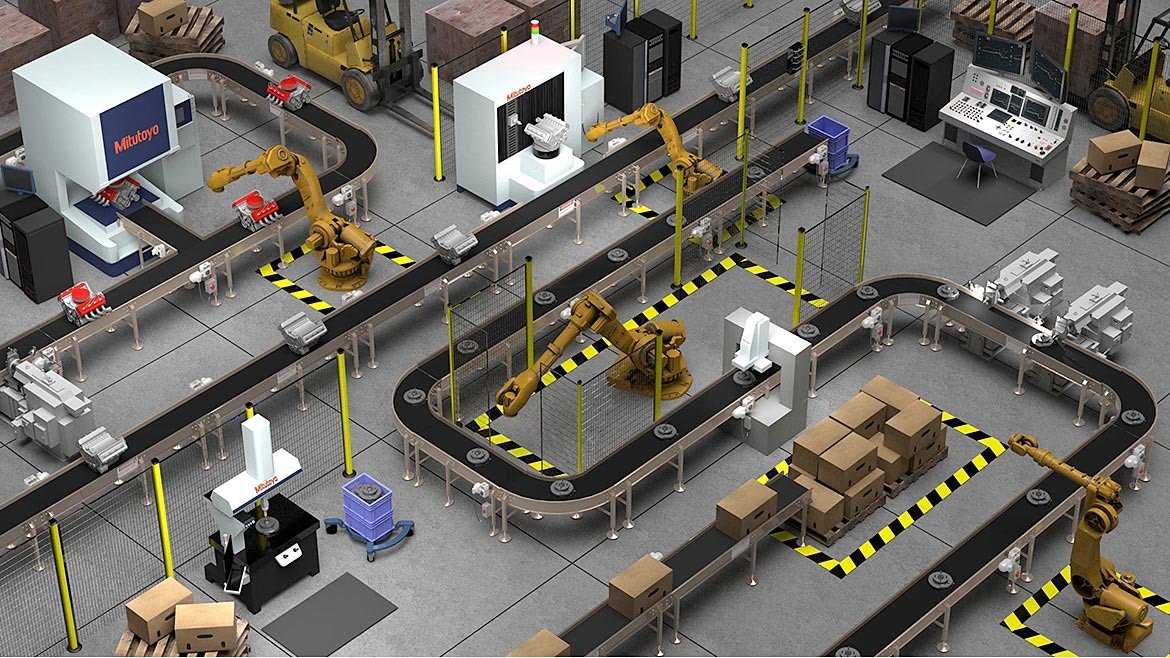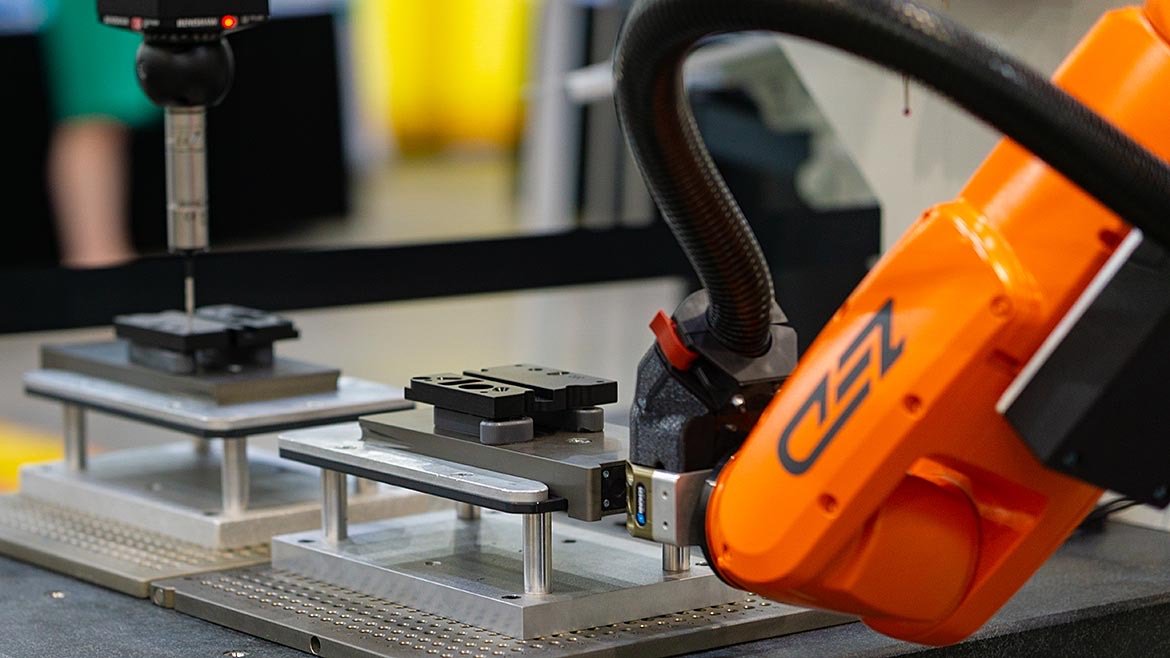The Rise of Industry 4.0 and its Impact on Metrology
By Fabian Vitte
As smart factories have grown to embrace more advanced technologies such as AI, machine learning, and smart sensors, they’ve also evolved to include more developed forms of metrology.
3d schematic of a factory using Metrology solutions in the production line - illustration Industry 4.0.
The term Industry 4.0 – also known as the Fourth Industrial Revolution (4IR) – was first introduced by Bosch in Germany in the early 2010’s to describe the integration of communication and information technology in manufacturing. In the wake of the global economic downturn caused by the Great Recession, governments and industries embraced the term to boost the economy. By the mid-2010s, the industry saw a wave of changes in manufacturing based on four fundamental technologies:
Connectivity, cloud technologies, Internet of Things (IoT) and blockchain sensors
Artificial Intelligence, advanced analytics, big data, and machine learning
Robotics, automation, human/machine collaboration, including virtual and augmented reality
Advanced engineering and technologies (such as additive manufacturing, nanotechnologies, etc.)
The author during a customer demo in ZED Engineering lab.
These advancements made our factories smarter by enabling systems to communicate with each other, share live data, and make decisions without human intervention. As a result, manufacturers benefited from increased efficiency, faster production rate, lowered cost, and reduced lead-time. Early on, conversations were centered around “making more and faster” by focusing on productivity and streamlined operations. However, a critical (yet often overlooked) fundamental of this 4th revolution was the role of metrology. While technological advancements emphasized improving speed and output, it became increasingly clear that the gain had to be matched by high-tech quality assurance. It’s not enough to just produce more; production must be performed accurately and with limited downtime, scrap, and waste.
ZED Engineering application, automated inspection cell, with a robot arm loading a PCB into a vision machine for dimensional inspection
It soon became apparent that as production technologies and processes rapidly evolved, metrology had to adapt to keep up the pace. Even though metrology technologies advanced during the early days of 4IR, its implementation and integration into the manufacturing process was slightly behind. Technology was ready, but mindsets were not. While traditional metrology practices were used to inspect products and analyze the collected data to streamline processes, Industry 4.0 called for a more proactive and autonomous approach using real-time datato enable decision-making without any quality personnel.
The entire field of metrology has been impacted by Industry 4.0 by enabling solutions that deliver higher accuracy, efficiency and quality assurance. The key metrology areas impacted by Industry 4.0 include:
Advanced technology and hardware: sensors and related hardware are now developed with a more compact, accurate, and reliable design that also brings a broader range of data with higher accuracy.
Machine learning and autonomous decision making: the utilization of AI and machine learning drive the evolution of new inspection equipment. They allow systems to use predictive analytics and make decisions autonomously, which improves throughput.
Intelligent and connected equipment: IoT (Internet of Things) enables real-time data collection and monitoring, as well as adaptability to its environment (temperature compensation, re-calibration, etc.).
Traceability: advanced equipment facilitates the traceability of product through complex production processes. Initially, it also helped introduce the “digital twin”, which virtually creates a copy of the physical product, which opens doors to others analysis (such as simulation, virtual inspection, etc.).
In conclusion, Industry 4.0 has fundamentally transformed the role of metrology in manufacturing by shifting it from a reactive, post-production activity and long data analysis to a fully integrated and proactive solution that keeps adapting and evolving into its own process. As smart factories have grown to embrace more advanced technologies such as AI, machine learning, and smart sensors, they’ve also evolved to include more developed forms of metrology. The development of smart and connected equipment, advanced sensors, and autonomous measurement approaches have not only enhanced precision, but also optimized efficiency. As a result, the industry has benefited from real-time quality control and continuous improvement in manufacturing processes.
ZED Engineering application, automated inspection cell, with a robot arm loading a Mitutoyo CMM.
Ultimately, metrology will continue to be profoundly impacted by Industry 4.0 in unimaginable ways, unlocking new possibilities for precision and efficiency. As we stand on the cusp of even faster advancements with AI, we are left to wonder: how will the appearance of Industry 5.0 redefine the future of metrology?
Sources:
Alasdair Gilchrist. Industry 4.0 the Industrial Internet of Things. Berkeley, Ca Apress, 2016.
Alonso, Victor, et al. “Industry 4.0 Implications in Machine Vision Metrology: An Overview.” Procedia Manufacturing, vol. 41, 2019, pp. 359–366, https://doi.org/10.1016/j.promfg.2019.09.020.
“Industry 4.0: Why Metrology Retains a Key Role.” Mahr.com, 13 June 2023, www.mahr.com/en-int/news-events/article-view/industrie-40-warum-messtechnik-eine-schluesselrolle-behaelt. Accessed 23 Sept. 2024.
Fabian Vitte is the cofounder and operations manager at ZED Engineering LLC. With over a decade of experience in the industry, Fabian is a seasoned engineer with a global mindset. Having honed his skills across France, the UK, Canada, and the US, he brings a unique and well-rounded perspective to ZED Engineering. His expertise lies at the intersection of metrology, manufacturing, and automation, allowing him to develop cutting-edge solutions that streamline processes and deliver unparalleled throughput. For more information, please call (616) 843-4515, or visit zed-engineering.com.




